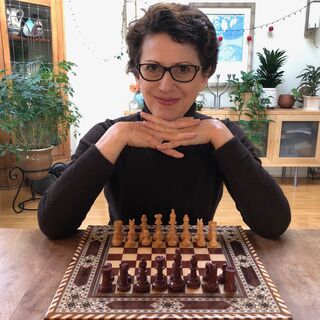Intuition
The Queen’s Gambit and Me
The surprising similarity between therapy and chess.
Posted December 27, 2020 Reviewed by Kaja Perina
When my daughter first suggested I watch the new Netflix series, The Queen’s Gambit, I thought, “Great! Maybe I’ll get to see my old neighborhood.” I grew up in Queens, one of the five boroughs of New York, and expected the show to be some mob caper set in my old hood.
From the first frame of The Queen’s Gambit, which is about a Kentucky orphan girl and chess, I was mesmerized. Thoughts of the show colonized my thinking for the three days it took me to get through the seven episodes. I loved it; it intrigued me and I cared deeply about the characters. It was a perfect jewel. But little did I know how those seven hours would change my life.
I don’t remember how it happened but a week or so after the final credits rolled, I started to research chess. I’d never played before and didn’t even know how the pieces moved so I typed “chess for beginners” into YouTube and curiously, became Alice, having fallen down the rabbit hole.

Chess feeds something that I hadn’t known I was starving for — the profound pleasure of escaping into a meditative state that uses my intuition, character, and mind to unknot complexity. I’ve always loved doing puzzles — 1,000 piece jigsaw puzzles and the New York Times crossword puzzle – but chess touches on more than just the intellect. It goes much deeper. It’s hard to describe. For me, it’s emotional.
I love learning the many rules that define chess and am starting to become familiar with the dozens of set moves. It was a delight to take The Queen’s Gambit as my usual opening. I was strangely transported to another realm in the first few games I played with my boyfriend, who'd played a bit before. I hadn’t known that concentrating could be so deeply satisfying. He learned quickly not to say a word when I’m playing chess. My brain switches into a mode that can’t incorporate conversation — I’m definitely going to hiss “shhhhh!” if he tries.
A large part of the game for me at this point, one month in, is managing my emotional state. I’m working on not becoming rattled if I blunder (make a move that didn’t take the opponent’s position into account). I need to be patient and not take pawns or pieces just because I can, but only when it will advance my position. I have to curb my enthusiasm and not get so swept away by an exciting move I have in mind that I overlook the fact that my opponent has something up their sleeve. That often happens. And I must accept both loss and victory equally graciously although I’m usually playing against the computer so I really don’t have to worry about hurting anyone’s feelings!
I find that I’m dreaming about chess these days and have started to see chess tactics and strategy in everything (okay, I know that’s a beginner’s thing). I’ve been a psychotherapist for 35 years and it's now clear to me how a course of therapy conforms, in many ways, to a chess game.
The first few therapy sessions, when you’re learning about your new client, are like the opening. You start slowly and respectfully, using moves that you’ve used many times before to get a feel for the person sitting across from you. You’re getting situated, knowing that you’re at the very beginning of an important relationship.
Things become more complex as you hear all the aspects of the struggles your client is facing. In this part of the therapy, the middle game, you’re searching for patterns. You’re learning about your client’s past, current situation, and possible future moves while, at the same time, responding deeply from a place of training, heart, and experience to move in sync with your client. It’s both a science and an art. You’re faced with reams of information and, without feeling overwhelmed, you have to make continuous decisions about which pieces are vital to attend to and which not to take.
Over time, the essential issues have been brought into focus and, in the end game, many of the peripheral bits have been eliminated so that only the primary core issues remain. There are fewer pieces on the board but every one is vitally important.
Your client is not, of course, your opponent and a course of therapy is certainly not a process of win or lose, but perhaps we can think of unknotting your client’s struggle as the mutual challenge for both of you. Maybe the pleasure at checkmate comes from feeling that you’ve shared a profound experience together to resolve something important and now you can celebrate that positive change has happened in your client’s life.
I've found that there have been many surprisingly meaningful aspects of life during the pandemic and discovering chess is certainly high up on my list. I smile when I think about it and look forward with anticipation to the next game. Where it’s going to fit into my uber busy life, I’m not sure, but at the moment, hey, set up the board, and let’s play!
If this post speaks to you, please share with us in the comments below!


